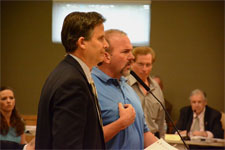
Civil Code Section 4925 grants to each member of a homeowners association (“HOA”) the right to attend HOA board meetings (except for executive session meetings). Section 4925 also grants members with rights to speak at board meetings and to address the board during open forum. However, these rights are explicitly granted to the HOA’s “members” (the owners of lots or units within the HOA’s development), not to a member’s agent or attorney. The California Court of Appeal addressed this issue in the 2013 case of SB Liberty, LLC v. Isla Verde Assn. Inc., where it affirmed a HOA’s ability to prohibit a member’s attorney from attending a board meeting on the member’s behalf.
However, Assembly Bill 1720 (“AB 1720”) was just proposed by the California Legislature in order to change this structure by amending parts of Section 4925. If signed into law, AB 1720 will add new subpart (c) to Section 4925 to state:
“The board shall permit an attorney who represents a member to attend any board meeting that the member is permitted to attend, regardless of whether the member attends. Where possible, the member shall give the board at least 48 hours advance written notice that his or her attorney will attend the board meeting.”
AB 1720 follows in the same vein as legislation which became effective January 1, 2015. That legislation (AB 1738) was enacted to grant a HOA member the right to be assisted by an attorney when the member is participating in Internal Dispute Resolution (IDR) with a member of the board.
| AB 1720 could be problematic for HOAs by placing boards in a position of having their meetings observed or disrupted by the attorney of a member whom is, or is likely to become, involved in a dispute with the HOA. Such a situation will likely have a chilling effect on the discussions and actions taken at a board meeting where a member’s attorney is present, especially if the HOA’s attorney is not present. While AB 1720’s language currently requires the member to, “where possible,” give the board at least 48 hours written notice that his/her attorney will attend the board meeting, it does not clearly specify whether the attorney must be allowed to attend regardless of whether the member actually provides such notice. Moreover, this notice requirement is presumably intended to provide the HOA with enough time to arrange for its attorney to attend the meeting as well. A mere forty eight (48) hours notice may not be sufficient in this respect. If anything, members should be required to comply with the same timeline currently imposed upon the HOA when it provides notice of board meetings to its members: four (4) days. We will continue to track AB 1720 as it makes its way through the legislature. |
 HOA Lawyer Blog
HOA Lawyer Blog


